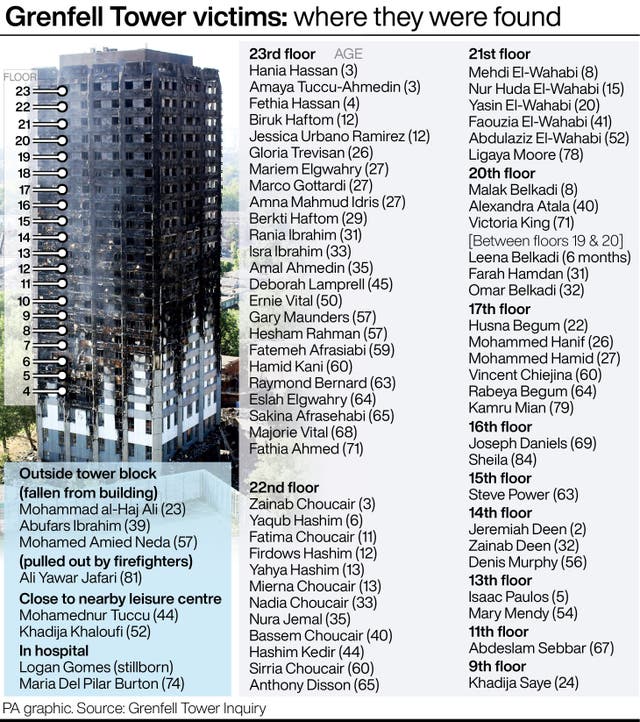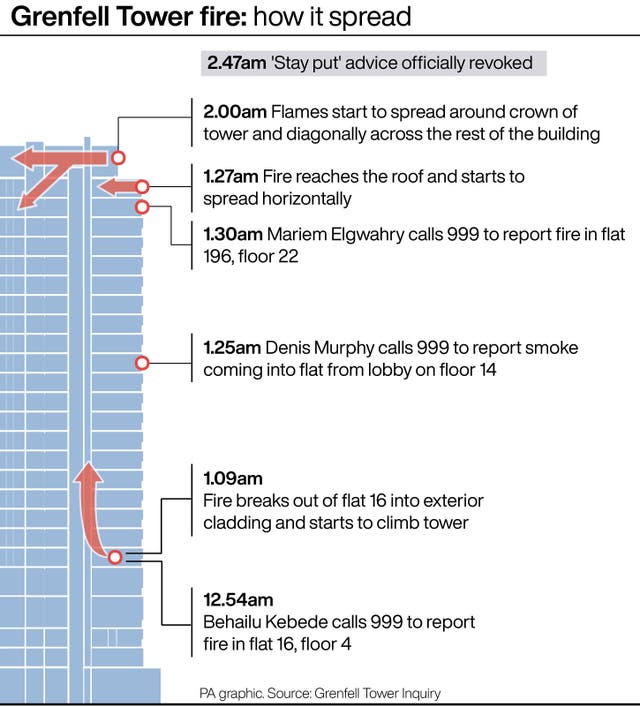Grenfell Tower fire: Victims let down by incompetence, dishonesty and greed
The Prime Minister, speaking as some Grenfell families sat in the House of Commons for his statement, said the disaster should never have happened.

A damning report into the Grenfell Tower fire has found victims, bereaved and survivors were “badly failed” through incompetence, dishonesty and greed, as the Prime Minister issued a state apology for a disaster he said should never have happened.
The long-awaited inquiry findings into the 2017 blaze which claimed the lives of 72 people concluded that each death was avoidable and had been preceded by “decades of failure” by government and the building industry to act on the dangers of flammable materials on high-rise buildings.
The west London tower block was covered in combustible products because of the “systematic dishonesty” of firms who made and sold the cladding and insulation, inquiry chairman Sir Martin Moore-Bick said.
The group, which represents some bereaved and survivors, called for a ban on government contracts for some of the companies involved – and Sir Keir Starmer told Parliament all firms found by the inquiry to be part of the “horrific failings” will be written to “as the first step” to stopping them being awarded such contracts.
But while describing the report as a “significant chapter” in the years since the fire, Grenfell United said “justice has not been delivered”, as they said police and prosecutors must “ensure that those who are truly responsible are held to account and brought to justice”.
The Metropolitan Police have pledged to go through the report “line by line”, but the bereaved and survivors are still facing an estimated 12 to 18-month wait to find out whether any criminal charges will be brought.
Sir Keir said it is “imperative that there is full accountability” for what happened, “including through the criminal justice process, and that this happens as swiftly as possible”.
“It should never have happened. The country failed to discharge its most fundamental duty, to protect you and your loved ones.”
There were emotional scenes as Sir Martin addressed the bereaved and survivors at a west London venue as he published his findings on Wednesday, confirming a “simple truth” that all the deaths were avoidable and that those who lived in the tower were “badly failed” by authorities “in most cases through incompetence but in some cases through dishonesty and greed”.
Among those he listed as bearing some responsibility were government, the Royal Borough of Kensington and Chelsea local authority, those who manufactured and supplied the materials used in the refurbishment and those who certified their suitability for use on high-rise buildings, as well as the London Fire Brigade.
The seven-volume and near-1,700 page final report of the inquiry into the disaster laid out in damning detail how those in positions of responsibility had not heeded or acted on warnings from earlier fires.
A drive within government, years before the fire, for deregulation, meant concerns about the safety of life had been “ignored, delayed or disregarded”, the report said, despite the deadly Lakanal House fire which killed six people in 2009.
In the years after, the agenda to cut red tape was “enthusiastically supported” by some politicians in charge, the report said.
On the industry side, cladding firm Arconic and insulation firms Kingspan and Celotex faced particularly heavy criticism.
Arconic was found to have “deliberately concealed from the market the true extent of the danger” of using its cladding product, particularly on high-rise buildings.

Celotex then, in an attempt to break into this market created by Kingspan, “embarked on a dishonest scheme to mislead its customers and the wider market”, Sir Martin concluded.
He said: “One very significant reason why Grenfell Tower came to be clad in combustible materials was systematic dishonesty on the part of those who made and sold the rainscreen cladding panels and insulation products.”
Firms had “engaged in deliberate and sustained strategies to manipulate the testing processes, misrepresent test data and mislead the market”, the report said.
Sir Martin concluded that the fire had been “the culmination of decades of failure by central government and other bodies in positions of responsibility in the construction industry to look carefully into the danger of incorporating combustible materials into the external walls of high-rise residential buildings and to act on the information available to them”.

This failure had “many causes”, including a “chronic lack of effective leadership”, combined with “undue emphasis on process and a culture of complacency”, the report said.
Setting out 58 recommendations, Sir Martin concluded that the construction industry had become “too complex and fragmented”.
He suggested a single regulator should be put in place to be responsible for regulation of construction products, testing and certification, and oversight of building control, and for the Government to bring all functions relating to fire safety into one department under a single secretary of state.
The Prime Minister said the Government will “look at” all of the recommendations “in detail” and respond within six months, as it pledged to also update Parliament annually on progress against its commitments.





